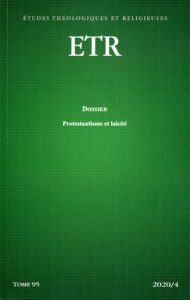Aborder la thématique de la laïcité au regard de l’Ancien Testament présente le risque de l’anachronisme, c’est pourquoi Dany Nocquet aborde la thématique sous trois aspects qui peuvent faire écho à une compréhension laïque du monde. Le premier établit que l’Ancien Testament introduit une distanciation entre pouvoir politique et religion dans un univers culturel ou les pouvoirs royal et religieux sont intimement liés. Le second, en discussion avec Jan Assmann, montre comment certains passages travaillent le monothéisme yahwiste en l’ouvrant à une acceptation de croyances différentes. Le troisième souligne combien une partie de la pensée biblique révise la représentation exclusive d’Israël pour envisager une élection partagée et une accessibilité décloisonnée au divin.
Mots-clés : laïcité, Ancien Testament, Jan Assmann, exclusivisme, universalisme, pluralité, religion, politique, Proche-Orient ancien, monothéisme
Hebrew bible and secular thinking, distant proximity or timeless resonance?
Addressing the theme of secularism in the light of the Old Testament carries the risk of anachronism, which is why the author approaches the subject from three aspects which can echo a secular comprehension of the world. The first is that the Old Testament introduces distanciation between political power and religion in a cultural universe where royal and religious powers are closely linked. The second, in discussion with Jan Assmann, shows how certain passages work on Yahwistic monotheism by opening it up to acceptation of different beliefs. The third highlights how part of biblical thinking revises the exclusive representation of Israel to consider shared election and decompartmentalised accessibility to the divine.
p. 603-623
Auteur
NOCQUET Dany
Dany NOCQUET est doyen de la Faculté de théologie de Montpellier, où il enseigne l’Ancien Testament et membre du Centre de recherches interdisciplinaires en sciences humaines et sociales (CRISES – EA 4424).
